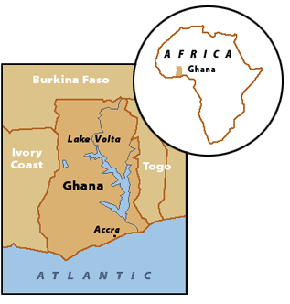
Ghana
The first country in colonial Africa to gain its independence (1957), Ghana has been a stable democracy since 1992. It continues to enjoy an open society, with a vibrant media and strong public dialogue, outperforming most countries on the continent in civil liberties, political rights and political stability.
The country covers an area of 238,500 square kilometers and has an estimated population of 27 million.
Considered a regional model for economic reform, Ghana has achieved strong growth through sound macroeconomic management. Its GDP is $42.69 billion. Its 5-year compound annual growth rate is 6.6%.

The country’s economy is dominated by agriculture, which employs about 56 percent of the working population. Ghana is one of the leading exporters of cocoa in the world. It is also a significant exporter of commodities such as gold and lumber. It is rich in mineral deposits, including manganese, gold, and bauxite. Oil production began in 2012, with current reserves of 800 million barrels and the potential for at least one billion more.
Ghana is a key U.S. ally in promoting economic and political reform and respect for human rights in West Africa. Ghana plays a constructive role as a stabilizing influence in the region and is committed to helping resolve regional conflicts and promoting regional security.
Primary, junior, and secondary school education is tuition-free and mandatory in Ghana, although there are charges for uniforms and fees. Students begin their six-year primary education at age six. They continue through junior secondary school for three years, which provides academic, technical and vocational training. Those who continue move into the three-year senior secondary school program. Entrance into one of the five Ghanaian public universities is determined by a national examination following completion of senior secondary school.
EPI’s involvement in Ghana began in 2007 and today we sponsor students at three universities: the University of Ghana, Accra, and Kwame Nkruma University of Science and Technology (KNUST), Kumasi, and the University for Development Studies, Tamale. All scholarship recipients can be classified as “gifted;” all are from families and areas of great financial need, and have had to overcome extremely challenging obstacles on their paths to a university education.
For a more in-depth look at Ghana today, please see the You-Tube video: Portrait of a Nation.
And to watch the address by the President of Ghana, Akufo-Addo, at the Winter 2018 U.S. Governors Conference: Click Here